How the Braves saved their season
On July 10 in Miami, Atlanta Braves star Ronald Acuna Jr. raced back to the right-field warning track, chasing a fly ball off the bat of Jazz Chisholm. Acuna leaped and landed awkwardly, twisting his right knee. He crumpled to the ground, tried to walk off, then fell to the turf again. He held his face in agony and eventually had to be carted off the field.
The Braves lost that day and fell to 44-44, later learning that Acuna suffered a full tear of his right ACL. At the time, FanGraphs assigned Atlanta a 1.3% chance of reaching the World Series. On July 11, the Braves fell a game under .500. On July 12, FiveThirtyEight gave them a 2% chance of reaching the World Series in their playoff prediction update.
At the time of his injury, Acuna was slashing .283/.394/.596, leading the NL in WAR (4.2) while ranking third in home runs (24) and steals (17). An average Atlanta team losing an MVP candidate didn't seem like a recipe for success. Yet here the Braves are, earning their first World Series berth since 1999 after a remarkable close to the regular season and after they ran through the NL field.
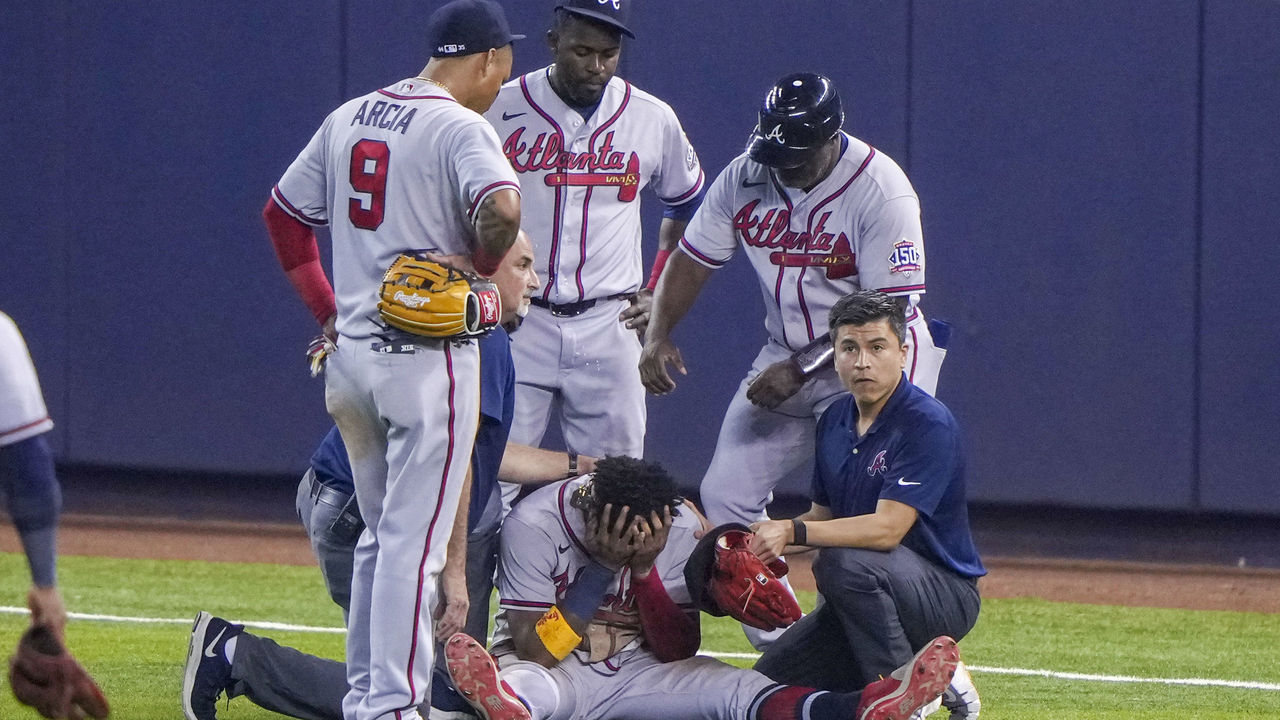
So, how did the Braves do it?
Sure, it helps that Charlie Morton is impervious to aging and that the club rosters a pair of enviable, young, front-of-the-rotation arms in Max Fried and Ian Anderson. Tyler Matzek is one of the best stories in baseball, a once highly prized prospect whose career was nearly ended by the yips only to re-emerge as a dominant left-handed reliever.
But the Braves are primarily here because they acquired an entirely new outfield at midseason, and for a low cost in prospect treasure. The moves not only helped fill in regular-season production voids, but they also helped propel the team through October.
Recall it wasn't just that the Braves lost Acuna. The club had already demoted its Opening Day center fielder, Cristian Pache, to Triple-A in late April. The promising prospect never hit and spent most of the year in the minors. In late May, Braves left fielder Marcell Ozuna was arrested on domestic violence charges. He's been on MLB administrative leave ever since.
A day after Acuna's injury, the Braves started Ehire Adrianza (career 84 wRC+) in right field, Orlando Arcia (career 70 wRC+), an infielder by trade, in left, and Guillermo Heredia (career 83 wRC+) in center.
What the club thought was a strength entering the year was arguably the weakest outfield in the majors. The Braves needed a new group, and general manager Alex Anthopoulos delivered.
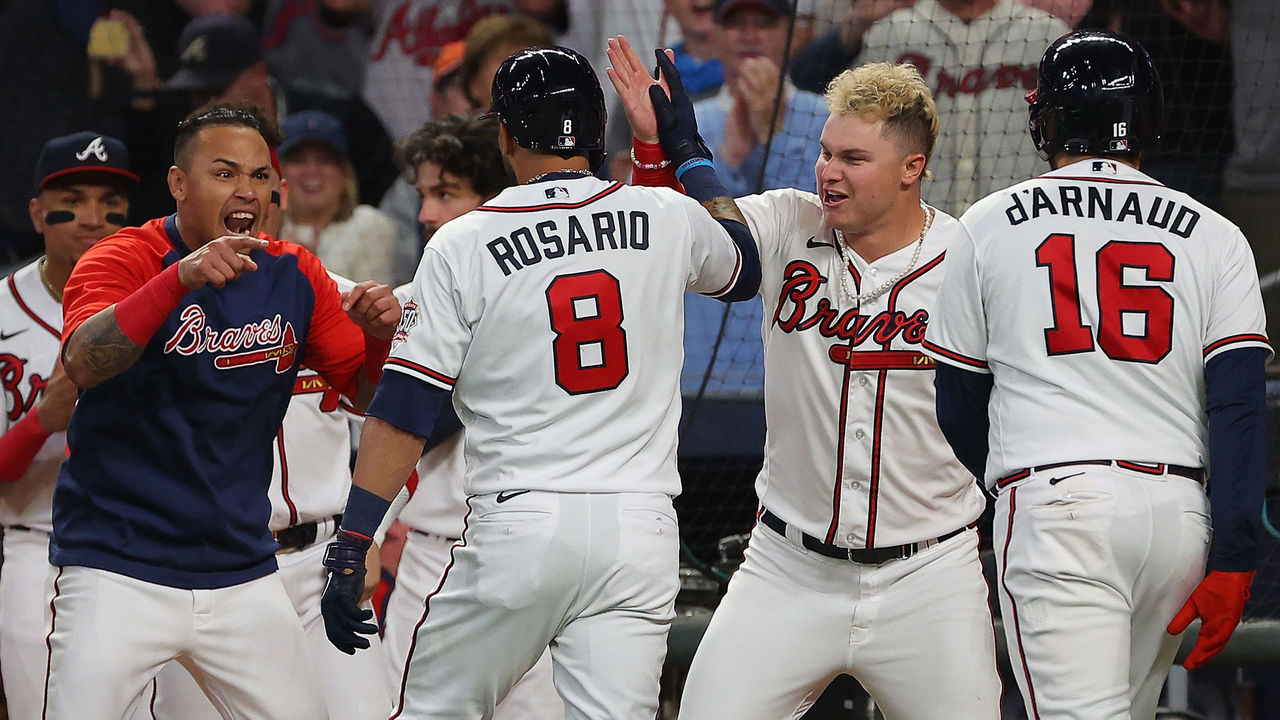
While the New York Yankees, Toronto Blue Jays, and Los Angeles Dodgers made the biggest trade deadline splashes, the Braves' moves were the most effective from a value standpoint. And if you want to judge them by the most important measure, they're still playing.
On July 15, Atlanta acquired Joc Pederson from the Chicago Cubs for minor-league first baseman Bryce Ball, a modest prospect. Pederson was just a so-so upgrade in the regular season, posting a 96 OPS+ with the Braves. But he's been excellent in the postseason, smashing three home runs and driving in nine runs to go along with a .909 OPS.
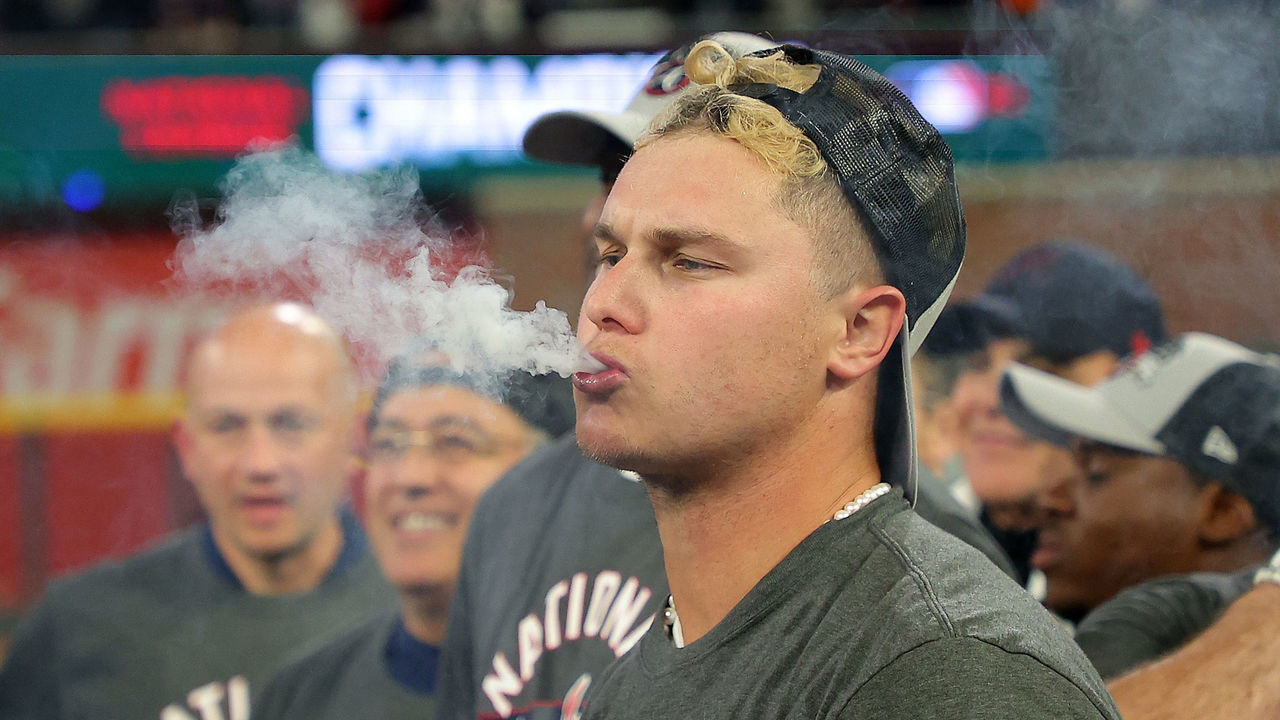
On July 30, right before the deadline, Atlanta pulled off three deals for outfield help.
The Braves made one of the great short-term rental trades in recent memory by acquiring Eddie Rosario from the Cleveland Indians for Pablo Sandoval. All Rosario has done is supply Atlanta with a .903 OPS in the regular season and a 1.313 OPS in the playoffs, as well as three postseason home runs and a team-best 11 RBIs.
The Braves also reacquired Adam Duvall from the Miami Marlins and Jorge Soler from the Kansas City Royals, two more lost-cost outfield bats.
Duvall was the most productive of the outfield adds in the regular season, producing 1.2 WAR after the trade. He's also homered and driven in four in the postseason. While Soler struggled with the Royals, posting a .658 OPS, he improved to a .882 OPS with Atlanta.
Soler was also 11th among position players in Win Probability Added - which totals the change in win expectancy before and after plate appearances - following the trade. For Soler, the Braves sent pitching prospect Kasey Kalich, a 2019 fourth-round pick, to Kansas City. Atlanta dealt catcher Alex Jackson to Miami. Neither is a top-end prospect.
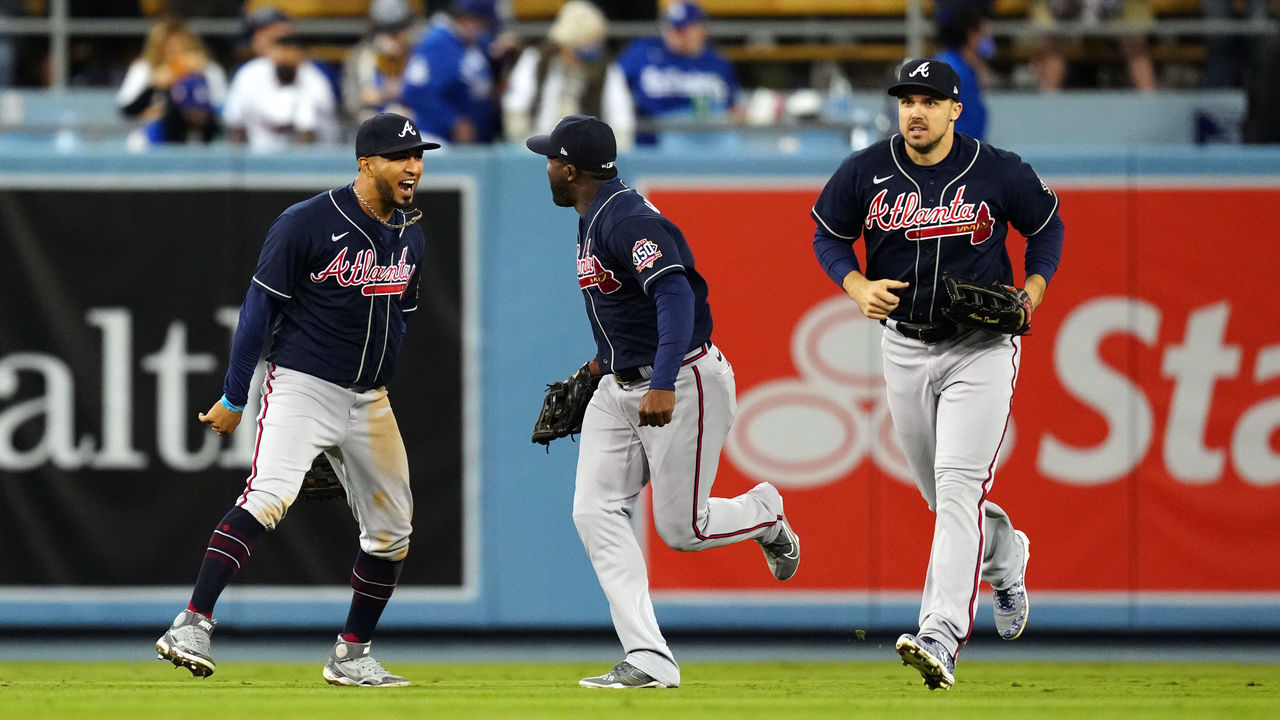
The impact of deadline deals is often overstated. Back in July, we found that of the five previous trade-deadline periods, including the shortened 2020 season, 137 of the 231 MLB players acquired produced zero or negative WAR the rest of that year. The average return was 0.26 WAR per player.
Pederson (0.3 bWAR), Rosario (0.5), Soler (1.0), and Duvall (1.2) all beat that benchmark with Atlanta.
From 2016-20, only four teams' aggregate trade deadline additions reached or exceeded this group's combined 3 WAR in a single season: the Yankees (2017 and 2018), the Cubs (2018), and the Tampa Bay Rays (2018).
The outfielders' postseason impact has been even greater. Pederson, Rosario, and Duvall have accounted for 10 of the Braves' 12 postseason home runs and 24 of their 39 RBIs.
While the Blue Jays received 1.4 WAR from Jose Berrios after the deadline and the Yankees enjoyed contributions from a number of their acquisitions, Toronto and New York gave up premium prospects and either fell short of the playoffs (Blue Jays) or failed to advance from the wild-card game (Yankees). And the Braves, of course, topped Max Scherzer, Trea Turner, and the Dodgers in the NLCS.
The Braves bought low and won big with outfielders.
Had Atlanta, which won the NL East by 6.5 games, not made those deals, the race with the Philadelphia Phillies would've been a lot tighter. Without those deals, the Braves certainly wouldn't be in the World Series and have upset a team in the NLCS with 106 regular-season wins.
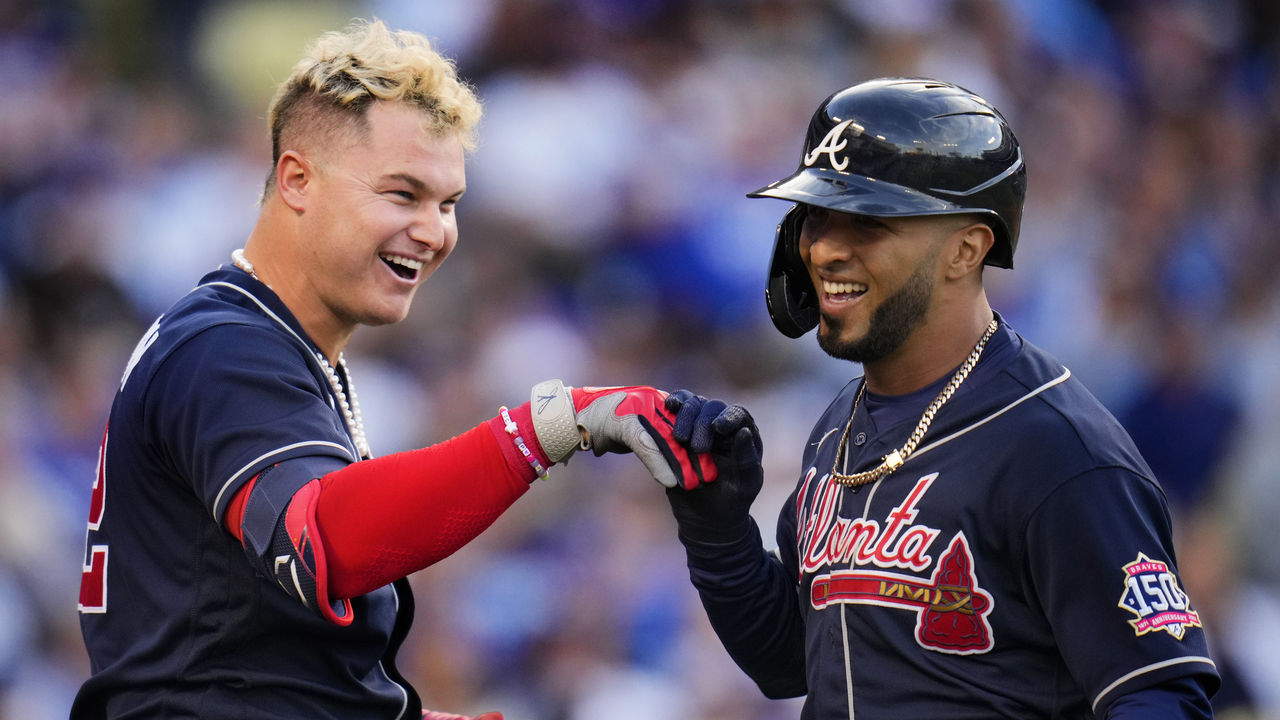
The additions gave the Braves more power and ability in the outfield, and more balance with two left-handed and two right-handed bats added to the roster. That balance can be especially important in October.
The remade-on-the-fly outfield bolstered Atlanta in the regular season, and those deals might not be done producing magic for the club in the playoffs. Trade-deadline additions are often overstated in value, but they meant everything for the Braves. They saved the season and propelled the club to the brink of a World Series championship.
Travis Sawchik is theScore's senior baseball writer. Follow him on Twitter at @Travis_Sawchik.